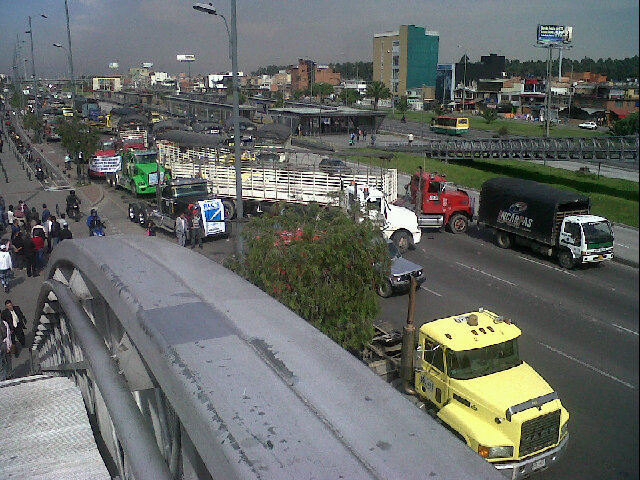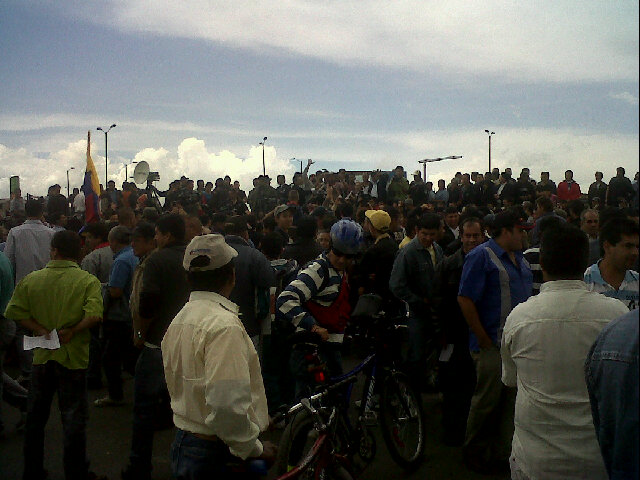Since February 2, 2011, Colombian truck drivers [es] have been on national strike due to government reforms that aim to remove the table of cargo charges that, according to the internet news site La silla vacía [es](The Empty Chair), “regulates, since 1997, the minimum prices of the transportation of cargo in the country.”
The Vice President of the Colombian Association of Truck Drivers (ACC), Pablo Mogollón, explains that [es] “it is a government measure for the country to increase its competitiveness at the expense of the incomes of the haulers, because without the table of cargo charges the manufacturers will pay whatever they want to pay them and whenever they want.”
Thus, since the start of February there has been a partial reduction of cargo mobility throughout the country, which has gradually become more noticeable due to the increase in the number of workers of this profession, who have decided to locate themselves, with their trucks, at different places on the Colombian road network.
On February 15, the issue became one of the most mentioned in traditional and citizen media, because of various reports of traffic congestion in the capital, Bogotá, caused by a significant number of truck drivers who decided to immobilize their vehicles, parking them in various important streets, especially in the west of the city.
On Twitter, with the hashtag #parocamionero [es] (#truckdriverstrike), opinions are divided between those who support the demonstration by this group of workers and those who criticize them for creating chaos and affecting the mobility in the city.
Steven M Palma (@Stemuo) says:
Yo estoy con los camioneros. De lógica y razón tanta gente no puede estar protestando por ocio #parocamionero
Daniel Carrera Osorno (@dacaos_212) mentions the present excessive cost of petrol that does not only affect truck drivers:
Todos deberiamos unirnos al #parocamionero [es], todos somos victimas del sobrecosto de la gasolina, todos hacemos uso del transporte.
For @culebr0, the responsibility for what happened rests with the government. Camilo Andrés Suárez (@Kami_an) shares the difficulties that his secretary experienced due to the standstill of some of the streets of Bogotá and therefore, of specific transport routes. His secretary arrived at her home late at night because of the problems in getting transportation:
ahora la secre de la empresa me cuenta las peripecias que tuvo que pasar anoche para llegar a su casa a las 12AM, gracias #parocamionero !!
She also told him about hundreds of people who had to opt to walk in order to reach their destinations due to the streets’ conditions [es]:
Me dijo que gracias a #parocamionero cientos de personas tuvieron que caminar para llegar a sus casas, con peleas, robos, inseguridad y frio
Opponents allude to the chaos caused by the lack of mobility and the loss of stored foods in containers. Camilo de Guzmán (@CamiloDeGuzman) thinks:
Ceder ante bloqueos q atentan contra la movilidad ciudadana, el orden publico y la economía distrital es validar el #chantaje #parocamionero
JaBn (@antimonetario) writes:
Gente en el mundo que se muere de hambre y la comida pudriendose en un contenedor #parocamionero [es]
Rose Viatella (@RViatella) expresses a sentiment shared by many who have been affected by the strike:
Ay! que el paro se arregle pronto, no es justo que uno tenga que pagar las consecuencias #ParoCamionero [es]
At the end of writing this post, a meeting between government representatives and representatives of the truck drivers had been scheduled for 5pm, Colombian time, on February 15th.









1 comment